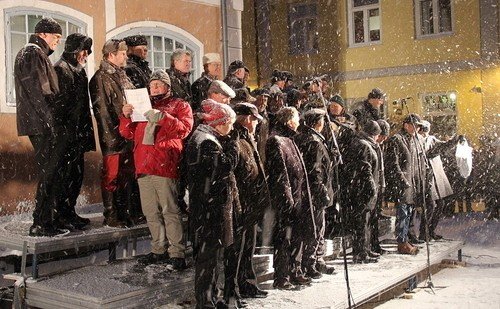When Britain declared war on Germany in August 1914, there were many who said, ‘It’ll all be over by Christmas!’
People thought it was just a small, local difficulty, as though they were saying, ‘It won’t need a large army to sort it out’. How wrong they were!
What began in the balmy days of summer was a global combat, dragged out over four weary years, costing the lives of millions of young men and changing the political landscape of the nations.
But the whole of mankind is involved in a much more serious conflict, a long war against God. This battle began a very long time ago in the garden of Eden, when Adam asserted his independence, shook his fist in the face of God, and preferred to side with his wife in blatant disobedience to God’s command.
That act of defiance changed everything: God became the enemy, and God’s perfect creation was marred by disease, pain, toil, sorrow, sin and death. The Bible makes this clear: ‘Through one man, sin entered the world, and death through sin, and thus death spread to all men, because all sinned’ (Romans 5:12).
Continued war
It’s one thing to play down the seriousness of a natural war; it’s far more dangerous not to face up to the fact that we are enemies of God.

The Bible says our minds are at enmity with God, and this shows itself by wicked works — acts that break God’s ten commandments — such as lying, stealing and lustful thoughts; living for self and leaving God out of everything.
The tragedy of modern society is that, despite amazing technical advances, the rebellious heart of man remains unchanged. The poem, ‘The paradox of our time’, recognises much of this:
‘We talk too much, love too seldom and hate too often…
We have conquered outer space, but not inner space…
We’ve cleaned up the air, but polluted our soul.’
This is what God calls sin. He can’t sweep it under the carpet and pretend it’s not there. It creates a barrier between himself, a holy and perfect God, and a world of whom he says, ‘all have sinned, and fall short of the glory of God’ (Romans 3:23).
The Bible treats sin and death very seriously. We are told, ‘No one has power in the day of death. There is no release from that war’ (Ecclesiastes 8:8). Neither is death some convenient annihilation.
We are responsible for our actions and, ‘It is appointed for men to die once, but after this the judgment’ (Hebrews 9:27). If in this life we have never sued for peace, never sought to get right with the God we’ve offended, never repented of our sins, then only an eternal, conscious hell — away from Christ and all good — lies ahead for our never-dying souls.
Offer of peace
The good news of the Bible is that this frightful destiny need never be ours. Sinful men and women can be at peace with a holy God, for God himself has provided the way.
This was the great message of the Christmas angels to those shepherds in Bethlehem: ‘Glory to God in the highest, and on earth peace, goodwill towards men’ (Luke 2:14). This peace comes only through Jesus Christ, the Prince of Peace, whose birth was foretold in the book of Isaiah, 700 years before it happened.
But peace must come on God’s terms. This is what makes the Christian message unique. False religion expects the sinner to contribute something towards achieving heaven, such as going on a pilgrimage, doing good works, contributing cash to a good cause, or even sacrificing health and life.
But the Bible tells us we can do nothing to achieve peace with God. Instead, God sent his spotless Son to earth on a rescue mission to save helpless sinners. This was an act of undeserved love on God’s part.
The angels of Bethlehem declared this to the shepherds on that never-to-be-forgotten night: ‘There is born to you this day … a Saviour, who is Christ the Lord’ (Luke 2:11). Even Tolstoy, who wrote War and Peace, recognised the marvel this was: ‘You can love a person dear to you with a human love, but an enemy can only be loved with divine love’.
Finished peace
In human conflicts, peace is never more than a temporary truce, waiting for the next offence to break it. God’s peace is permanent. The Babe of Bethlehem came to earth to become the man of Calvary. There, when he died in agony and blood, we know that permanent reconciliation was made for all the sins of all who put their trust in Christ.
The Word of God says: ‘He was pierced for our transgressions; he was crushed for our iniquities; upon him was the chastisement that brought us peace, and with his wounds we are healed’ (Isaiah 53:5).
On that cross, Jesus Christ was bearing the full penalty of sin. He was our substitute. We are told, ‘He is our peace’; ‘he made peace through the blood of his cross’ (Ephesians 2:14; Colossians 1:20).
Accepted peace?
Will you take God’s offer of peace? Will you lay down your arms, and oppose this God of love no more? ‘Speak comfort to Jerusalem, and cry out to her, that her warfare is ended, that her iniquity is pardoned’ (Isaiah 40:2).
Will you abandon futile attempts to please God by your own efforts, and come humbly and take his free gift? The good news this Christmas is that the Lord Jesus came to accomplish everlasting peace for all who trust his finished work.
The hymn writer, Horatius Bonar, summarised it so well:
I hear the words of love,
I gaze upon the blood,
I see the mighty sacrifice,
And I have peace with God.
’Tis everlasting peace,
Sure as Jehovah’s name;
’Tis stable as His steadfast throne,
For evermore the same.
Martin Wells served as an elder at Welcome Hall Evangelical Church, Bromsgrove







